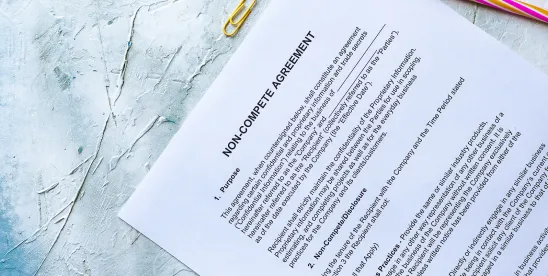After the nationwide injunction barring the Federal Trade Commission (FTC) Noncompete ban, we reported that “employers can expect that states will continue to introduce legislation aimed at restricting the use of noncompetes.”
In the first few months of 2025, Virginia and Wyoming passed legislation restricting noncompetes, and Arkansas, Louisiana, and Maryland passed legislation restricting physician noncompetes. We also reported on pending legislation in New York, Ohio, Texas, and Washington aimed at limiting noncompetes and other restrictive covenants. We are a third of the way through the calendar year, and July 1 (the date many laws go into effect) is approaching. This post addresses legislation pending in seven other states that also seek to limit the use of noncompetes.
States Seeking To Ban All Noncompetes Both Retroactively and Prospectively
Michigan
In January 2025, Michigan introduced House Bill 4040 (HB4040) that if enacted, would prohibit businesses from entering into, enforcing, or representing the existence of noncompetes with any workers. The only exceptions under the HB4040 are for a worker who sells their ownership stake in a business or a worker who is responsible for selling substantially all of the business’s assets. If passed, Michigan would join California, Minnesota, North Dakota, and Oklahoma as the only states that broadly prohibit noncompetes between employers and employees.
Washington
We previously reported that the Washington State legislature introduced HB1155 that, if passed, would broaden the definition of “noncompetition covenant” and prohibit all employer-employee noncompete agreements regardless of when it was entered into. Thus, the Bill would render all noncompetition covenants void and unenforceable regardless of when the parties entered into the agreement. Additionally, employers with current or former employees or independent contractors subject to a noncompetition covenant would be required to inform them by October 1, 2025 that the covenant is no longer enforceable.
As promised, we have been monitoring HB1155, which is currently with the Rules Committee for a second reading. We will continue to closely monitor this Bill.
States Seeking To Ban All Future Noncompetes
Tennessee
In February 2025, Tennessee introduced companion bills, Senate Bill 0995 (SB0995) and House Bill 1034 (HB1034), that seek to broadly prohibit the use of noncompetes in Tennessee. The bills state that except for the limited use of noncompetes in connection with the bona fide purchase of a physician’s practice (as provided under § 63-6-204(f)(2)), “a restriction on the right of an employee or contractor to practice the employee's or contractor’s profession upon termination or conclusion of the employment or contractual relationship is void and unenforceable in this state.” If passed, the bill would take effect on July 1, 2025 and would apply prospectively, so it would not affect existing noncompetes with Tennessee employees.
On March 25, 2025, SB0995 was assigned to the General Subcommittee of the Senate Commerce and Labor Committee, where it remains pending. Since SB0995 has made some progress through the Tennessee Senate, and if passed, would bar noncompetes in Tennessee, we will continue to closely monitor this Bill. Meanwhile, on March 19, 2025, HB1034 was deferred until 2026.
Arizona
Arizona House Bill 2589 (HB2589) seeks to make it unlawful for a private or public employer to require a current or prospective employee to agree to a noncompete clause. HB2589 defines “noncompete clause” as “a clause in an employment contract with an employee that prohibits the employee from working in a specific geographic area for a specific period of time after leaving that employment.” HB2589 has had a second reading in the legislature, but no votes on the bill have yet occurred.
States Seeking To Implement Minimum Salary Thresholds
North Carolina
In March 2025, North Carolina introduced a bill titled the Workforce Freedom and Protection Act (the “WFPA”), that seeks to ban noncompetes for “employees”, defined as someone who provides “labor or services to another for pay of less than” $75,000 per year. The WFPA defines a noncompete as an agreement between an employer and an employee that restricts the employee, after termination of employment, from doing one or more of the following things: (i) working for another employer for a specified period of time; (ii) working in a specified geographical area; or (iii) engaging in work activities similar to those performed for the employer.
If passed, the WFPA would prohibit an employer from: (a) entering into a noncompete with an “employee”; (b) requiring an “employee” to enter into a noncompete as a condition of employment; (c) enforcing or attempting to enforce a noncompete; (d) threatening to enforce a non-compete; or (e) in the case of a franchise operator, entering into an agreement that restricts an “employee” from moving between locations. Therefore, noncompetes would be prohibited for any employee who earn less than $75,000 per year.
If passed, North Carolina would join other jurisdictions that maintain minimum salary thresholds for noncompetes, including Colorado, District of Columbia, Illinois, Maine, Maryland, New Hampshire, Oregon, Rhode Island, Virginia, and Washington. Although not specifically tied to a minimum salary, noncompetes in Idaho are only enforceable against “key employees” and noncompetes in Nevada cannot apply to employees paid on an hourly wage basis.
Furthermore, the WFPA states that “[n]o employer may require an employee who primarily resides or works in North Carolina to agree to a contract provision that would (i) require the employee to adjudicate outside of North Carolina a claim arising in this State or (ii) deprive the employee of the protection of North Carolina law for a claim arising in this State. Any such provision is void and unenforceable.” If the WFPA is enacted into law, an employer’s workers located in North Carolina would be subject to the protections of the WFPA.
Any person injured by a violation of the WFPA may bring a civil action to recover actual damages, reasonable attorneys’ fees and costs, as well as other relief. The Attorney General of North Carolina would be empowered to investigate violations and bring an action to enforce the WFPA.
Kentucky
In February 2025, House Bill HB690 (HB690) was introduced in the General Assembly of the Commonwealth of Kentucky. If passed, this bill would prohibit employers from entering into, enforcing, or threatening to enforce a “covenant not to compete with any covered employee.” The bill defines a “covenant not to compete” as any agreement “between an employer and employee that restrains, prohibits, or otherwise restricts an individual's ability, following the termination of the individual's employment, to compete with his or her former employer.” The bill defines “covered employee” as an employee earning less than $2,000 per week, including interns, students, apprentices, and independent contractors. The bill would amend existing labor law to establish civil penalties for employers who violate the new provisions, with potential fines ranging from $1,000 to $10,000 per violation.
Vermont
In February 2025, VT H0205 was introduced in the General Assembly of the State of Vermont. If passed, this bill would render noncompetes void and unenforceable between an employer and employee so long as the employee makes less than $100,000 in annual gross wages.
Section 2 of the Bill defines “agreement not to compete” as an agreement between an employee and employer that restricts an employee, after separation of employment, from (i) working for another employer for a period of time, (ii) working in a specific geographical area, or (iii) working for another employer in a similar capacity to the employee’s work with the former employer. Confidentiality/non-disclosure agreements are not included in the definition of an agreement not to compete. Also excluded from the definition are non-solicit agreements, provided that the limitations set forth in the non-solicit provisions are reasonable in time, geographical area, and scope of the restraint. The bill defines a non-solicit agreement as an agreement in which the “employee agrees not to: (A) solicit or recruit the employer’s employees; or (B) solicit or transact business with customers or clients of the employer who were customers or clients while the employee was employed by the employer.”
If passed, employers will be required to comply with specific notice requirements. First, if an employer requires a prospective employee who may be subject to a noncompete to sign a noncompete covenant, the employer: (1) must provide the prospective employee with the agreement at the time of the offer of employment, and (2) cannot rescind the offer of employment earlier than three business days after the prospective employee receives the noncompete agreement. Second, because the bill would apply retroactively, if an employee is subject to an existing noncompete but does not meet the minimum salary threshold or other requirements of the bill, the employer is required to notify each employee, in writing, that the agreement is no longer enforceable.
The bill, if passed, does not prohibit an individual from entering into a noncompete agreement in relation to the sale of an individual ownership interest in a business, dissolution of a partnership, dissolution of an LLC, or a severance agreement, so long as the agreement is reasonable.
States That Seek To Limit Noncompetes By Industry
Hawaii
Haw. Rev. State. 480-4(d), which became effective July 1, 2015, currently prohibits noncompetes in the technology industry. Hawaii Senate Bill 1161 (SB1161), if passed, would also void existing noncompetes and non-solicits, and prohibit future noncompete and non-solicit clauses, for workers in the restaurant and retail store industries. If SB1161 is enacted into law, it would take effect retroactive to July 1, 2015. The bill is currently pending before the Senate Labor and Technology Committee.
Takeaways
Based on the ever-changing restrictive covenant landscape, it is imperative that employers – especially those with employees in multiple states – keep updated on the various state noncompete laws. Given the recent changes to noncompete laws in many states, there is no “one-size-fits-all” approach to noncompete agreements. Employers should contact counsel to discuss any potential restrictive covenant issues and to implement or restructure state-by-state noncompetes.
We will continue to provide updates regarding new laws and pending legislation in the noncompete world. Up next: Florida’s recently introduced employer-friendly bill to provide a framework for permissible noncompete agreements.




 />i
/>i

